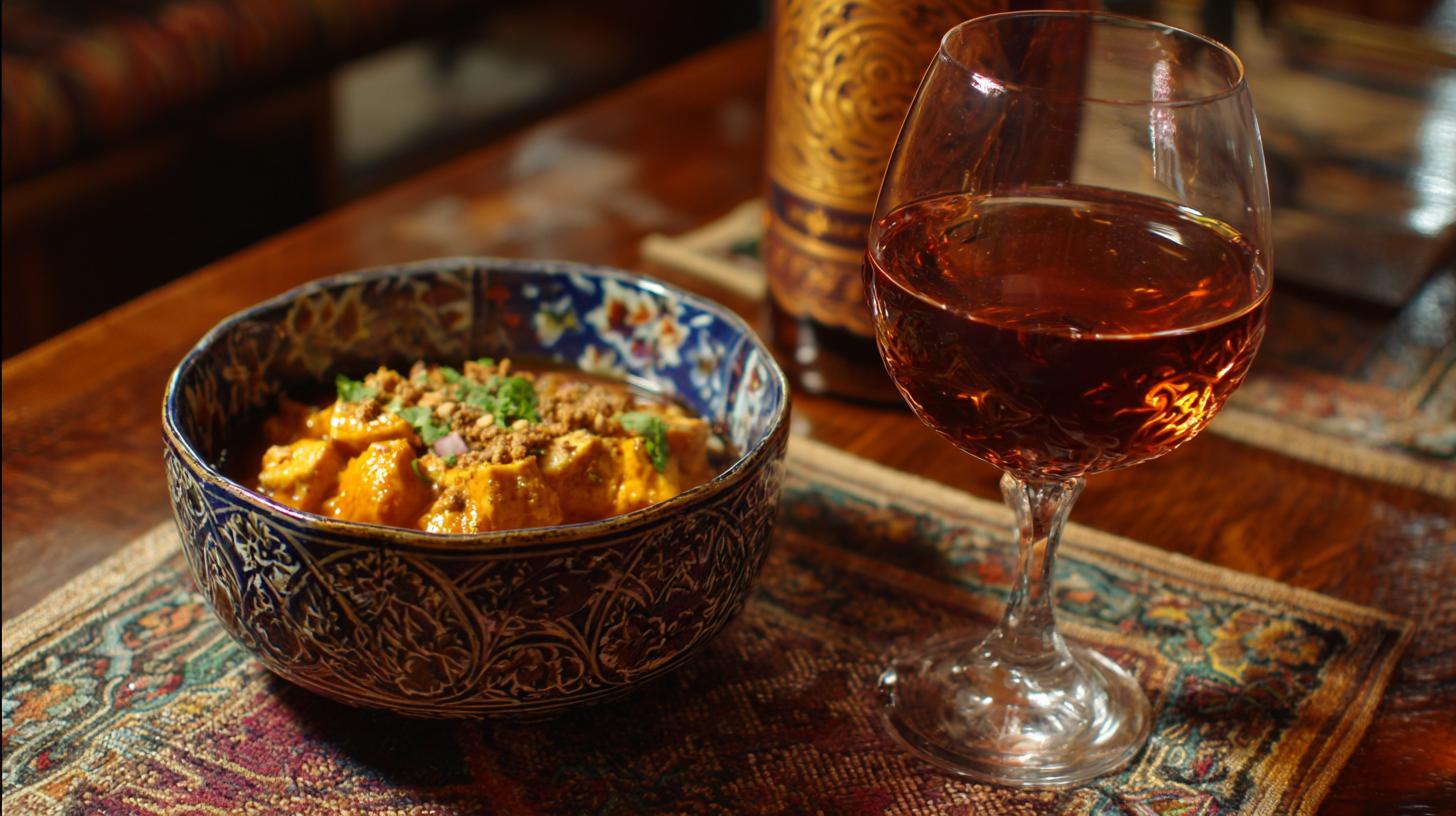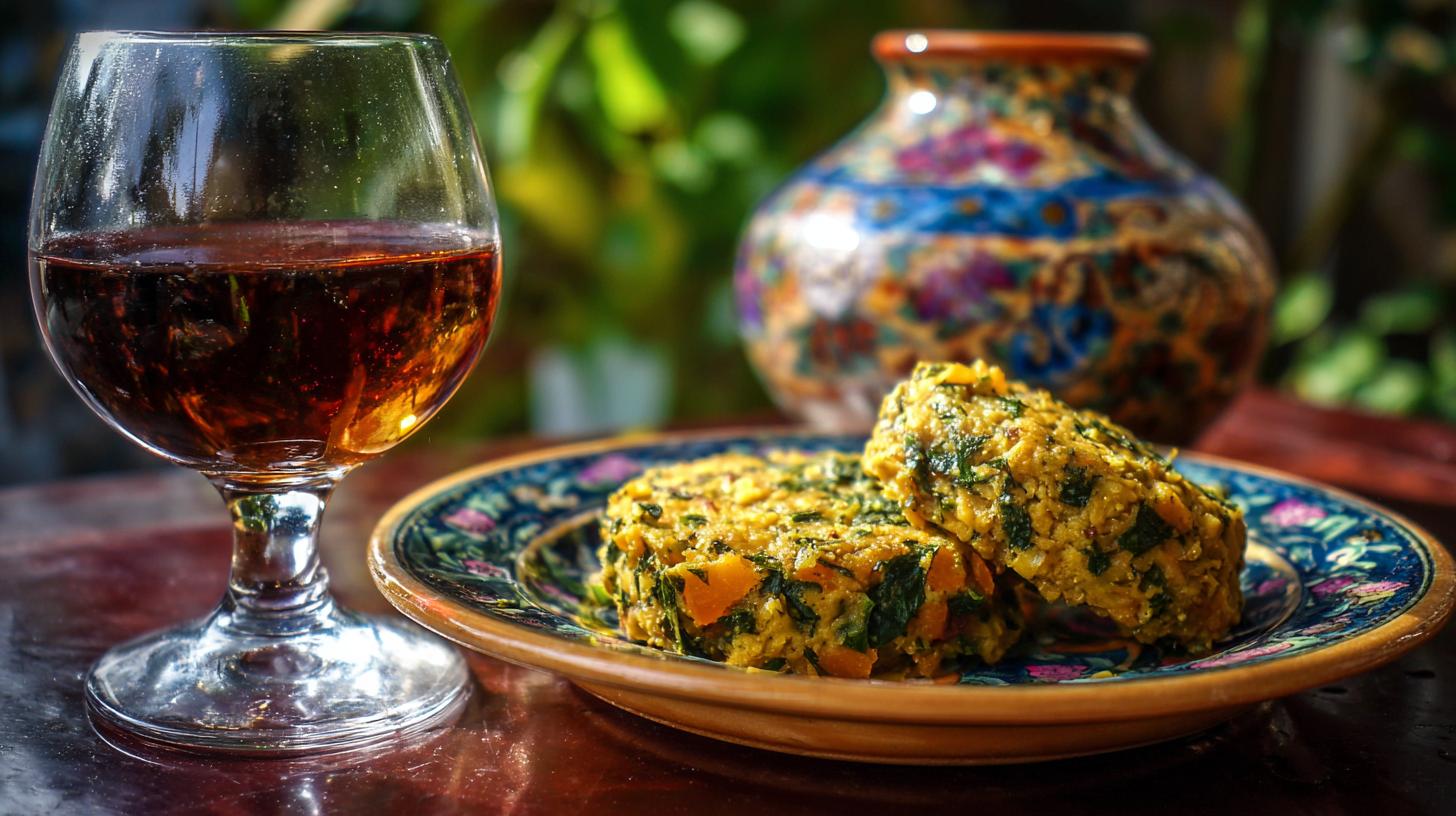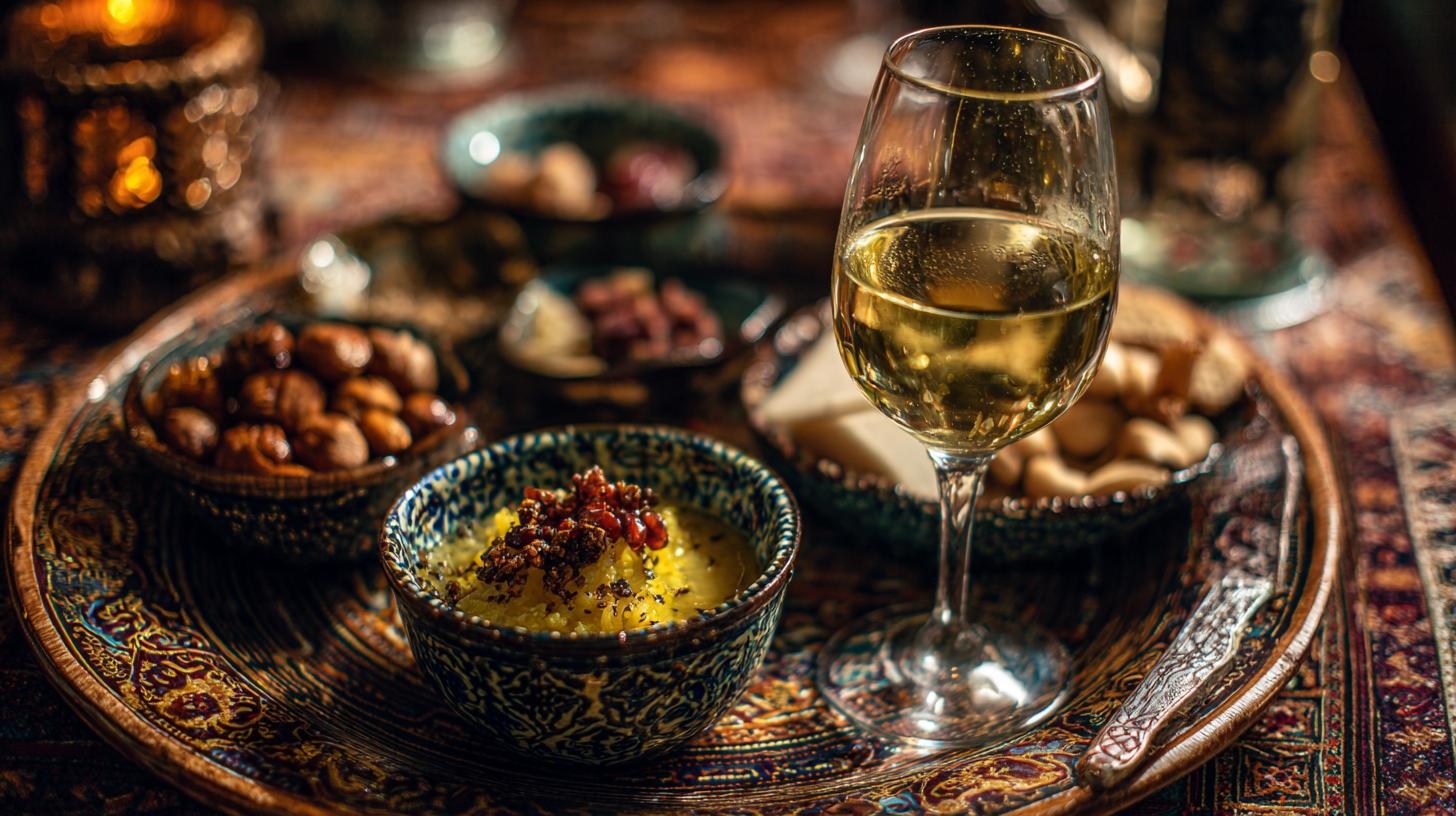Exploring the culinary traditions of Georgia opens a fascinating world of unique flavors, ancient recipes, and vibrant cultural stories. Among the many treasures of Georgian cuisine, the pairing of amber wine and pkhali stands out as a distinctive combination that reflects the country’s deep connection to nature and tradition. This article will take you on a flavorful journey, introducing you to the intriguing world of Georgian amber wine and the delicious, plant-based pkhali. Through this exploration, you will understand why amber wine and pkhali a Georgian vegan pairing, and how these elements together create a balanced and memorable dining experience.
A Glimpse into Georgian Cuisine
Georgian food is a rich tapestry woven from centuries-old ingredients and cooking techniques, shaped by the diverse geography and multicultural influences that the region has experienced. The country is renowned for its harmonious blends of fresh herbs, nuts, vegetables, and spices, all of which contribute to the vibrant colors and bold tastes that characterize Georgian dishes.
When it comes to vegan cuisine, Georgia offers a wide variety of options that go far beyond the typical salads or vegetable stews found in other kitchens. Among these, pkhali – a traditional vegetable and walnut dish – holds a prominent place. Pkhali is not just a recipe; it is a culinary expression of the Georgian affinity for combining textures, flavors, and healing herbs to create wholesome, plant-based dishes.
At the same time, Georgia’s winemaking tradition dates back thousands of years and is intrinsically linked to its food culture. The unique style of wine production includes amber wines, also known as skin-contact wines, which are made using ancient methods. The interplay of amber wine and pkhali a Georgian vegan pairing gains special significance when you consider how the wine’s characteristics complement the dish’s fresh, herby flavors.
Understanding Amber Wine
Amber wine is a category of white wine crafted with an extended skin contact process, where grape skins remain in contact with the juice for days or even weeks. This method imparts deeper color, a richer texture, and complex aromatic compounds absent in conventional white wines. The subtle tannins, flavors of dried fruits, wildflowers, and sometimes a slight oxidation make amber wine both robust and nuanced.
This style of winemaking is a nod to ancient traditions, as Georgia is considered one of the oldest wine-producing regions in the world, dating back nearly 8,000 years. Traditional Georgian winemakers use qvevri – large clay vessels buried underground – to ferment and mature their wines. Such vessels are essential in producing authentic amber wine, preserving natural freshness and imparting distinctive earthy notes.
When we talk about amber wine and pkhali a Georgian vegan pairing, it’s crucial to understand how the wine’s texture and flavor profile interact with pkhali’s ingredients. Amber wine’s depth and slight tannic edge balance the rich walnut paste in pkhali and the fresh, herbal qualities from spinach, beet leaves, or other vegetables. The slight acidity in amber wine brightens the dish, cutting through the nutty, sometimes oily texture of pkhali.
The Production Process of Amber Wine
- Selection of white grape varieties (Rkatsiteli and Mtsvane are common in Georgia)
- Crushing grapes and allowing the juice to ferment with skins and seeds
- Fermentation lasting anywhere between a few days to several weeks
- Pressing and aging in qvevri or oak barrels
- Bottling with minimal intervention to preserve natural flavors
This meticulous process requires patience and expertise, contributing to the artisanal quality of Georgian amber wines.
The Tradition of Pkhali in Georgian Cuisine
Pkhali is a broad category of vegetable-based appetizers or side dishes traditionally served cold and often presented as part of the “supra,” the Georgian feast. It mainly consists of finely chopped or pureed vegetables combined with ground walnuts, garlic, vinegar, and an assortment of fresh herbs like coriander, dill, and fenugreek.
What makes pkhali a quintessential vegan dish is that all its ingredients are plant-based, yet it manages to be richly flavorful and texturally interesting. The walnut paste adds creaminess and depth, while the vegetables bring freshness and earthiness. The use of garlic and vinegar intensifies the flavor profile, making pkhali an ideal companion to more substantial dishes or as a palate awakener.
Popular Variations of Pkhali
| Type of Pkhali | Main Vegetable Ingredient | Typical Flavor Notes |
|---|---|---|
| Spinach Pkhali (Shpinali Pkhali) | Spinach | Earthy, bright, herbaceous |
| Beet Pkhali | Beetroot leaves and/or beetroot | Sweet, earthy, slightly tangy |
| Cabbage Pkhali | Cabbage | Crisp, mildly sweet, nutty |
| Eggplant Pkhali | Eggplant | Smoky, creamy, rich |
| Green Bean Pkhali | Green beans | Fresh, slightly sweet, crunchy |
This variety ensures that vegan diners can enjoy different flavor experiences within the same dish framework. The use of walnuts is consistent across types, ensuring a unifying creamy, slightly bitter undertone.
How Pkhali Is Made
The basic process for making pkhali involves:
1. Boiling or steaming vegetables until tender.
2. Chopping the cooked vegetables finely or pulsing them in a food processor.
3. Preparing a paste of ground walnuts mixed with garlic, vinegar or lemon juice, salt, and fresh herbs.
4. Combining the vegetable base with the walnut-herb mixture.
5. Forming the mixture into small balls or spreading it as a soft pâté.
6. Garnishing with pomegranate seeds or additional herbs for color and tang.
This recipe is simple yet allows for endless creativity with the choice of vegetables and herbs.
Why Amber Wine and Pkhali a Georgian Vegan Pairing?
This pairing is not accidental but arises from the natural harmony between the ingredients found in both amber wine and pkhali. Here’s why they complement each other so well:
Flavor Balance and Texture
Amber wine offers moderate tannins and textured richness that match the creamy but slightly gritty walnut paste in pkhali. The herbal aromas in both the wine and the dish resonate, creating a seamless sensory experience. Pkhali’s acidity from vinegar contrasts and balances the wine’s fruit-forward characteristics, while its garlic and herbs mirror the wine’s complexity.
Enhancement of Natural Ingredients
Both amber wine and pkhali celebrate natural, ancient ingredients. The grapes’ natural tannins and complexity in amber wine pair with the natural oils and richness of walnuts and herbs. This emphasis on minimal interference means that the pairing highlights the pure, authentic flavors.
Cultural and Historical Connection
In Georgia, food and wine culture are deeply intertwined. The tradition of making amber wine using qvevri and presenting pkhali at the supra reflects Georgia’s history and values — communal dining, respect for nature, and celebration of local produce. Pairing amber wine and pkhali a Georgian vegan pairing is a cultural experience as much as a culinary one.
How to Serve Amber Wine with Pkhali

Serving amber wine and pkhali together involves attention to temperature, presentation, and complementing side dishes. Amber wine is ideally served slightly chilled but not too cold—around 12-14°C (54-57°F) is ideal. This helps highlight its aromatic qualities without dulling the subtle tannins.
Pkhali should be served as part of a spread, often with fresh bread or traditional Georgian lavash. The dish is typically presented in small portions or as bite-sized balls, garnished with pomegranate seeds for color and brightness, creating both an aesthetic and flavorful appeal.
Additional Pairing Tips
- Include a side of fresh herbs (like cilantro and parsley) to echo pkhali’s flavors
- Offer toasted walnuts to enhance the nutty notes in both the dish and wine
- Add a bowl of pickled vegetables for contrasting acidity
- Complement the meal with other Georgian vegan dishes such as lobio (bean stew) or mchadi (cornbread)
By approaching the pairing this way, amber wine and pkhali a Georgian vegan pairing become an immersive experience that engages multiple senses.
The Rising Popularity of Georgian Amber Wines and Pkhali Worldwide
In recent years, amber wine has been gaining attention from sommeliers, wine enthusiasts, and chefs worldwide for its unique flavor profile and historical significance. It offers a complex alternative to traditional whites or reds and often appeals to those looking for natural or organic wines. Similarly, pkhali fits perfectly within the growing trend of plant-based diets and vegan cuisine, thanks to its nourishing yet light qualities.
This pairing embodies sustainability, respect for ancient traditions, and a holistic approach to food and drink. As global palates become more adventurous and open, amber wine and pkhali a Georgian vegan pairing provide a delicious gateway into the flavors and culture of the Caucasus region.
Restaurants and Events Featuring Amber Wine and Pkhali
| City | Restaurant/Event | Highlight |
|---|---|---|
| Tbilisi, Georgia | Barbarestan | Traditional pkhali served with multiple amber wines made locally |
| London, UK | Vinoterra | Special tasting of Georgian amber wines paired with vegan Georgian starters |
| New York, USA | Khevsureti | Georgian fusion dishes, including pkhali and amber wine flights |
| Paris, France | Terroirs | Natural wines collection featuring amber wines alongside Georgian vegan snacks |
Such venues and events help spread the appreciation of this pairing beyond Georgia’s borders, inviting more people to discover its unique appeal.
Shopping for Amber Wine and Ingredients for Pkhali
If you wish to experience amber wine and pkhali a Georgian vegan pairing at home, it is helpful to know where to find authentic products and ingredients.
Finding Amber Wine
Amber wines are still relatively niche in many markets but can be found through:
- Specialty wine shops focusing on natural or Eastern European wines
- Online wine retailers with a selection of Georgian wines
- Georgian markets or cultural stores in major cities with diaspora communities
When selecting amber wine, look for labels indicating qvevri fermentation or mention “skin-contact” white wines.
Ingredients for Pkhali
You can find most pkhali ingredients at well-stocked grocery stores or ethnic markets:
- Walnuts: shelled, raw walnuts with fresh flavor
- Fresh herbs: coriander, dill, fenugreek (or substitute with mild alternatives)
- Vegetables: spinach, beets, cabbage, or green beans depending on the type of pkhali you want
- Garlic and vinegar (usually wine or apple cider vinegar)
- Pomegranate seeds for garnish
With these components, you can experiment at home, creating your own versions of this Georgian vegan classic.
Tips for Preparing Pkhali at Home

Making pkhali at home can be a rewarding process. Here are some tips to ensure you get the texture and flavor right:
- Use fresh, high-quality walnuts to avoid a bitter taste.
- Steam or boil vegetables until tender but not mushy; you want a slight bite.
- Ensure garlic is finely minced; raw garlic is often preferred for the pungency it brings.
- Adjust the vinegar or lemon juice to balance tartness; too much can overpower the walnuts.
- Mix ingredients thoroughly to achieve a homogeneous texture, forming into small balls or cakes for serving.
- Chill the dish before serving to let flavors meld and intensify.
With practice, you’ll develop a sense of harmony between all the flavors, echoing the originality of this Georgian staple.
Exploring Variations and Personal Touches

While tradition offers many options for pkhali, there’s room to get creative, especially when pairing with amber wine. You might try including unusual herbs like marigold or basil, or experimenting with vinegars like pomegranate or sherry wine vinegar to add depth.
Similarly, amber wine itself varies significantly by vintage and producer, so matching softer or more robust wines with different types of pkhali can enhance the tasting experience. For example, a fruitier amber wine with pronounced notes of apricot may highlight sweeter beetroot pkhali, while an earthier wine with subtle spices could enhance spinach pkhali.
Health Benefits of Amber Wine and Pkhali as a Vegan Pairing
Both amber wine and pkhali carry healthful qualities, which may appeal to those keen on nutrition as well as taste. Amber wine maintains many polyphenols and antioxidants due to skin contact during fermentation. This can contribute to cardiovascular benefits and digestive support when consumed in moderation.
Pkhali, made primarily from vegetables and walnuts, provides a nutritious source of vitamins, healthy fats, fiber, and plant-based protein. The fresh herbs pack antioxidants and anti-inflammatory compounds, making pkhali not just a delicious dish but a wholesome one.
Together, amber wine and pkhali a Georgian vegan pairing offer a thoughtful option for those looking for a mindful and balanced dining experience with roots in natural ingredients and tradition.
—
In sum, the combination of amber wine with pkhali is a fine example of how Georgia’s culinary heritage connects food, drink, history, and culture. By understanding the nuances of this pairing, from the terroir of Georgian grapes and the complexity of qvevri amber wines to the traditional preparation of pkhali, anyone can appreciate this vegan-friendly duo and incorporate it into their own meals. Whether you are a wine enthusiast, vegan foodie, or curious traveler, delving into amber wine and pkhali a Georgian vegan pairing provides a rich sensory journey into a region that celebrates the harmony of nature and flavor.